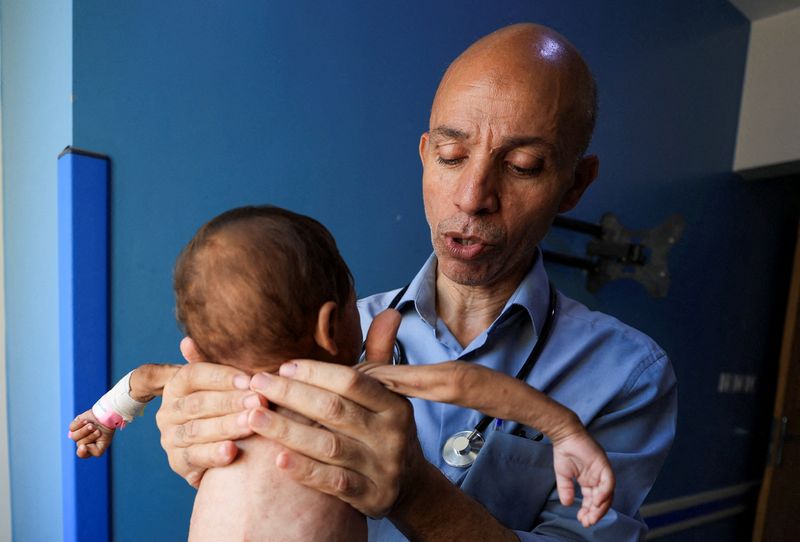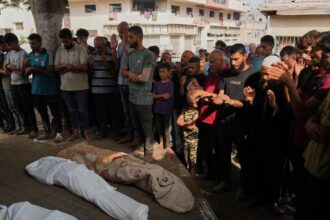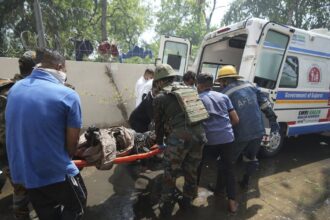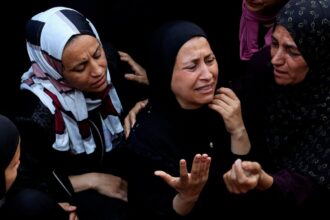The skeletal frames of Gaza’s children have become the most haunting testament to the humanitarian catastrophe unfolding in the besieged territory. As famine conditions take hold across northern Gaza, medical professionals are reporting an alarming surge in severe malnutrition cases, with children bearing the brunt of a crisis that shows no signs of abating.
At Al-Awda Hospital in Jabalia, pediatrician Dr. Hussam Abu Safiya witnesses the devastating impact daily. “We’re seeing children whose bodies have begun consuming their own tissue to survive,” he told me during a secure video call. “Their immune systems are collapsing, making them vulnerable to infections that would be manageable under normal circumstances.”
The statistics paint a grim picture. According to the latest UN assessment, acute malnutrition among children under five has skyrocketed to 15.6% in northern Gaza—a rate that has more than doubled since January. This places the region firmly above the 15% emergency threshold established by the World Health Organization.
Aid organizations continue to sound the alarm about access restrictions hampering humanitarian efforts. Despite a recent International Court of Justice ruling ordering Israel to ensure adequate food delivery to Gaza, the situation continues to deteriorate. The UN reports that only 23% of planned aid deliveries reached northern Gaza last month, representing a sharp decline from previous periods.
“The challenges we face in delivering essential supplies are unprecedented,” explains Maria Cortez, operations director for International Relief Coalition. “Multiple checkpoints, unpredictable closures, and active conflict zones create a logistical nightmare. Food and medical supplies often expire while waiting for clearance.”
For families like the Abdullahs in Beit Lahia, the situation has become desperate. “We boil grass to fill our children’s stomachs,” says Fatima Abdullah, mother of four. “My youngest doesn’t even cry anymore when she’s hungry—she’s too weak. This silence terrifies me more than her tears ever did.”
Health implications extend far beyond immediate hunger. Medical experts warn of long-term developmental consequences for children surviving on minimal nutrition. Cognitive impairment, stunted growth, and compromised immune function may affect an entire generation of Gazan children.
“What we’re witnessing is not just acute hunger, but the systematic undermining of a generation’s future,” notes Dr. Karim Nasser, a pediatric nutritionist monitoring the crisis remotely. “Even if food security improves tomorrow, the developmental damage already inflicted will echo for decades.”
The crisis has sparked renewed debates about international obligations during conflict. While Israel maintains that it does not restrict humanitarian aid, pointing to Hamas’s alleged diversion of supplies, humanitarian organizations counter that the volume of aid permitted entry remains woefully inadequate regardless of distribution challenges.
As winter approaches, the situation threatens to worsen. Shelter insecurity compounds nutritional challenges, with an estimated 75% of Gaza’s infrastructure damaged or destroyed. Children huddling in makeshift tents face increased caloric needs precisely when food is most scarce.
World health authorities are calling for immediate implementation of humanitarian corridors and pauses in fighting to facilitate aid delivery. “Every day of delay translates directly to preventable child deaths,” warns WHO regional director Dr. Aisha Mahmoud. “This is not a matter of politics but of fundamental human rights and international humanitarian law.”
As this preventable tragedy unfolds before a watching world, we must ask ourselves: At what point does our collective failure to protect children from starvation become complicity in their suffering?










